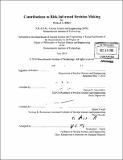Contributions to risk-informed decision making
Author(s)
Elliott, Michael A. (Michael Alfred)
DownloadFull printable version (16.20Mb)
Alternative title
Contributions to RIDM
Other Contributors
Massachusetts Institute of Technology. Dept. of Nuclear Science and Engineering.
Advisor
George E. Apostolakis.
Terms of use
Metadata
Show full item recordAbstract
Risk-informed decision-making (RIDM) is a formal process that assists stakeholders make decisions in the face of uncertainty. At MIT, a tool known as the Analytic Deliberative Decision Making Process (ADP) has been under development for a number of years to provide an efficient framework for implementing RIDM. ADP was initially developed as a tool to be used by a small group of stakeholders but now it has become desirable to extend ADP to an engineering scale that can be used by many individual across large organizations. This dissertation identifies and addresses four challenges in extended the ADP to an engineering scale. Rigorous preference elicitation using pairwise comparisons is addressed. A new method for judging numerical scales used in these comparisons is presented along with a new type of scale. This theory is tested by an experiment involving 64 individuals and it is found that the optimal scale is a matter of individual choice. The elicitation of expert opinion is studied and a process that adapts to the complexity of the decision at hand is proposed. This method is tested with a case study involving the choice of a heat removal technology for a new type of fission reactor. Issues related to the unique informational needs of large organizations are investigated and new tools to handle these needs are developed. Finally, difficulties with computationally intensive modeling and simulation are identified and a new method of uncertainty propagation using orthogonal polynomials is explored. Using a code designed to investigate the LOCA behavior of a fission reactor, it is demonstrated that this new propagation methods offers superior convergence over existing techniques.
Description
Thesis (Ph. D.)--Massachusetts Institute of Technology, Dept. of Nuclear Science and Engineering, 2010. Cataloged from PDF version of thesis. Includes bibliographical references (p. 104-107).
Date issued
2010Department
Massachusetts Institute of Technology. Department of Nuclear Science and EngineeringPublisher
Massachusetts Institute of Technology
Keywords
Nuclear Science and Engineering.